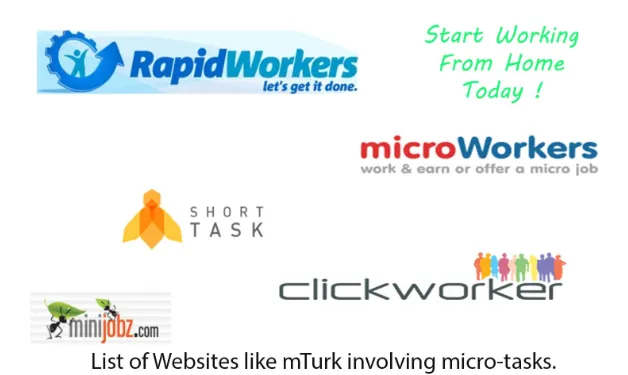Micro-working is a way of working online, completing small tasks for anything from a few cents to a few dollars which, after reaching a certain threshold gets paid out by transfer into Paypal, Payoneer or Skrill etc.
For employers, it as a way of getting crowd-sourced online tasks done very cheaply. Firmly aimed at developing nations, micro-working is useful to SEOs to get numbers on websites, likes on Facebook, views on Instagram and Youtube, in fact, any social media application where engagement figures are important.

There are other tasks which can be completed too. Writing short articles for a couple of dollars, surveys, even transcribing meter readings.
Sadly, however, many of these, in my opinion, fall into an ethical cesspool. Paying people to write reviews, or asking people to open email accounts are just two ways in which the integrity (if there is any left) of the internet gets called into question. I could name sites and products on Amazon and point out to you which review is fake. Ever read an app review on Playstore which at the end says “this is a sponsored review”? This means someone has been paid to download the app, keep it on their phone for a week then write a positive review. Reviews on Amazon that aren’t from verified buyers? Most probably bought.
So, setting ethical objections aside, this is still a way to empower someone perhaps in poverty for whom a few extra dollars a week is the difference between eating and eating well. So it’s a good thing, right?
Now I know you’re all probably wondering exactly how much can be earned in this manner, don’t forget, we’re not even talking Fivver here. So, for some real-life examples.

So, let's start with the top job, take a picture of your hand and upload it. Probably for use in some AI project for recognising body parts, completing this task to the employer's satisfaction pays you 0.14cents. the 93% is the percentage of people who have successfully completed the task so far, the '7' is the number of days you need to wait to get paid, the '10' is the number of minutes it's expected you'll need to complete the task and finally, so far, 486 people out of the 500 tasks available have been completed. It's just one employee per task in this case.
Now, if the tiny amounts on offer aren't bad enough, wait till you try to cash out!
The minimum for cashing out is $10 by Paypal or Dwollar or $20 by Payoneer and of course, there's a charge. As well as the Microworking site charging 7%, Payoneer for instance charges $3 for a payment in! On $20, that's a $4.40 hit, so all those hours commenting, liking and watching Youtube videos, you just got $15.40....ahhhh but hang on a minute, try and withdraw it and there's a £3 withdrawal charge on Payoneer AND a $5 monthly charge, leaving you with $7.40.
The point of all this is, that despite my reservations about the kinds of jobs that these sites offer, micro-working has a real potential to help people out of poverty but the main problem is the transfer of funds. The financial institutions basically steal all your hard work. It's too easy to suggest waiting for a few months before withdrawing, that would be a typical developed nations citizens' response. People who are struggling financially need money as they make it, $20 buys a whole load of groceries for a family in India for example and with a little application and effort, it's possible to make that amount per week. Obviously it's a dreadful wage for the effort but at least it's there.
So, how about blockchain transactions?
Last week, I wanted to send about $30 to someone here in Thailand. I think I was charged 1.63 Steem to convert to Bitcoin and transfer it to my Coins.th account, who have course have a buy/sell ratio and then who charged me 25baht (about 80cents) to get it into their bank account. Again, close to $3 dollars.
I'm not suggesting transfer fees are free, but for micro-amounts which people with very little are dealing with, there has to be a better way.
In the UK, we use tap and pay with our debit cards for transactions under £30, and these transactions cost the retailers just pennies, so why can't we beat that using blockchain?
Any Devs fancy a challenge?
Anyone fancy developing a Steem based Micro-working site? Payments completely using Steem or SBD. There is a huge ready-made workforce here of the people who regularly use micro-working sites. (I know many people do because tomorrow I will look at some of the Steem based jobs I see around the micro-working sites!). The site owner takes a percentage from the fee paid by the employer and the employee gets everything they earn into their Steemit wallet directly after the job completion is verified. Everybody wins.
This is one idea for Steemit that could truly help drag people up out of poverty and make it the blockchain of empowerment I hoped it could be.
If you need more info on micro-working, links to sites etc, please drop me a comment.